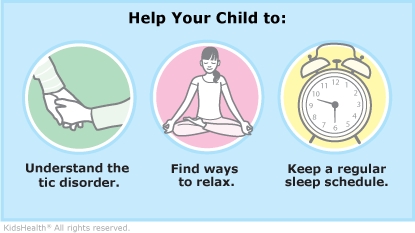Tics are short, sudden, repeated movements or sounds that kids can't completely control. Examples of tics include shrugging, sniffling, blinking, or throat clearing. Tics may be more noticeable when kids are stressed, anxious, or tired and are less frequent when they're relaxed. Tics don't happen while kids are fully asleep.
Usually kids can't decide to stop tics or control them. Sometimes they can briefly hold off a tic with a lot of effort. When this happens, kids may then have to "let out" tics that they held in earlier. Most tic disorders stop after a few months without treatment. Some may need treatment with medicine, and some tics can last more than a year.




Are tics harmful? Tics generally are harmless, and rarely are a sign of a more serious problem. Most tic disorders disappear within several months without any treatment, although some last for more than a year.
Do all tics need treatment? Health care providers usually don't treat tics with medicine unless they interfere with daily activities or social interactions, or cause kids significant pain. Many kids don't need treatment.
What is Tourette syndrome? In Tourette syndrome, a child has many motor tics (unusual way of walking, kicking, or jumping) and some vocal tics (clearing the throat, humming, or yelling). Kids may repeat what others say or repeat their own words. They also may have behavioral problems. Many teens with Tourette syndrome also have other conditions, like attention deficit hyperactivity disorder (ADHD), obsessive compulsive disorder (OCD), learning disabilities, or anxiety.